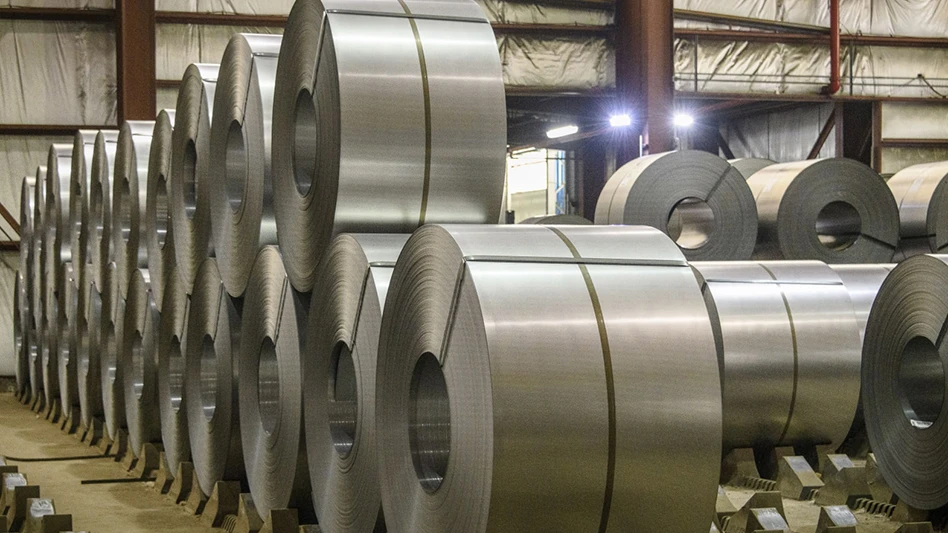Industry participants looking to obtain more “power” in their recycling niche will descend upon Orlando, Fla. in April to reap the benefits of the Institute of Scrap Recycling Industries, Inc. (ISRI) Annual Convention & Exposition.
The Orlando World Center Marriott is the venue for this year’s show, which runs from April 13 through 17. ISRI’s convention is widely recognized as the industry’s largest commercial event and a good place for today’s professional recycler to rub elbows with the rest of the industry and enlighten themselves about the current state of the scrap recycling industry.
“Power through Professionalism” is the theme of this year’s convention and an idea that will run through many of the show’s events. Essentially, the theme is meant to illustrate the clear lines that link business professionalism to power in the recycling industry. However, the events scheduled for this year’s show will go far beyond “illustration” of this concept. They will be designed to reinforce, motivate and educate attendees regarding the importance of professionalism for both the individual business manager and the entire industry.
ISRI will be touting education as the key component to acquiring professionalism and, thus, seizing power in one’s field. Show planners expect to help facilitate that kind of education through exposure to recognized achievers, interaction with others, and special market-oriented events.
According to Evelyn Haught, director of communications for ISRI, the opportunity for industry education is one of the show’s most viable selling points. “The educational aspect of the show makes it priceless for those competing in the industry,” Haught says.
The show’s educational sessions are divided into three different categories. The first type of seminar covers general business management, which explores strategies for making one’s recycling business both more lucrative and more efficient. The second type is exploration of metal commodities. (This is considered the “meat” of the show by many attendees, most of whom deal exclusively in metal.)
The third educational category focuses on issues and commodities of interest to non-metal recyclers. This is a new featured focus for the ISRI convention. “It’s the first time ISRI has broadened the scope to include non-metal commodities at the show,” Haught says. “It will give the paper and plastics industry a picture of where the market is for them.” She also notes that though the non-metal focus is on the paper industry, other non-metal industries would benefit greatly from what this aspect of the show has to offer.
According to Haught, the venue for this year’s show is smaller than the Moscone Convention Center, the San Francisco facility that hosted last year’s show. This is due, in part, to the smaller attendance expectations. (The 1998 event in San Francisco set all-time records for both attendance—more than 3,400—and booth spaces leased—205, plus 15 displays in the equipment area, leased by a total of 157 exhibitors.)
Those smaller expectations are primarily based on the tough year that the recycling industry has endured. This is not to suggest, however, that a good turnout is not expected. On the contrary, Haught says that they expect to come very close to their goal of 3,000 and, as this story goes to press, they have already reached the 1,000 mark as their early-bird registration closes. Haught says that ISRI expects its biggest rush of registrations between February 13th and March 12. At press time, 150 exhibitors had already registered with 250 indoor booth spaces booked.
Haught notes that ISRI’s website (www.isri.org) is doing much to help compensate for the dent put in attendance by this year’s weakened commodity prices. “It is bringing in an entirely new audience for the show,” Haught says.
And that new audience might be surprised by the number of attractions they will find in Orlando. Added to the usual annual offering at ISRI’s show will be several new events. A poolside welcome reception will serve as the convention’s ice breaker and power breakfasts will now be offered at every general session, featuring presentations by inspirational speakers.
Also new this year are two theme-related events: Power Beach, on the Marriott’s outside display area; and Power Drive, located inside the Marriott, opposite the exhibit hall. Power Beach will be an opportunity for show-goers to soak in some of the latest equipment (and some sun) in a very Orlando-esque, beach-like setting (beach balls included). Power Drive will be an “avenue” set up inside the Marriott, with displays promoting ISRI’s services where attendees can browse, shop and take a look at the ISRI literature.
ISRI’s show has also become well known for the talent that it brings in to speak. Last year’s attendees enjoyed presentations by both Gen. Colin Powell and George Stephanopoulos. This year’s most prominent speaker is former Senate Majority Leader and presidential candidate Bob Dole, who will speak on April 15 at the Keynote “Power Breakfast” and General Session.
Other selling points for the show include, according to Haught, “a very highly regarded spouse program as well as a kids program,” designed to make the wives, husbands and children of attendees feel welcome and included in the show festivities. There will also be a series of optional tours planned for those who register in advance to places like Universal Studios and Kennedy Space Station. (Each tour will take place only if a minimum registration of 35 is achieved.) This year’s show also features musical entertainment by pop singer Taylor Dayne.
“One very important person in the industry told me that they consider [the show] one-stop shopping,” Haught said. “They get the new technology, new products, and important [industry] people, all under one roof.” And from the looks of this year’s list of contributing exhibitors (see sidebar), that person would appear to be correct. That kind of marketplace visibility is one of the factors that contributes to making a success of each year’s ISRI show.
Shelly Zelunka, with Gensco Equipment Inc. in Toronto, is a regular exhibitor at ISRI and considers Gensco’s appearance at the show a necessity. “We need to be there because it would be noticeable if we weren’t there,” Zelunka said. “The exposure is important.”
Jose Pereyra, general sales manager, Sierra International Machinery, Bakersfield, Calif., is also familiar with the benefits of attending the show as an exhibitor. “Attending is good for networking,” Pereyra said. “It’s a great way to make new contacts and you get to meet people personally that you have talked to on the phone. Also, you get to visit with a lot of friends you haven’t seen in a long time.”
Zelunka believes that ISRI’s scrap-based focus makes it the clear choice of other recycling conventions. “The ISRI Show is a basic for us. Other shows tend to be more general, but the ISRI show seems to be more specialized. It targets our clientele.”
James Cicero, with CNA Commercial Insurance in Chicago, likens the show to “premium in our pockets, so to speak. We get to talk, first-hand, face-to-face with customers and prospective customers. In the past we have met people [at ISRI] and ended up writing their insurance coverage,” Cicero says. “We view the ISRI show as a long-term relationship that we’ve had for more than 30 years. We show our respect and support by attending.”
Orlando at a Glance
Orlando is undoubtedly the first city ever built by a mouse. (Though a pretty famous mouse at that.)
But before the red-shorts-wearing rodent descended on the central Florida city in the 1960s, the area was known mostly for its swamps, as well as cattle and citrus farming.
Rich with history, archaeological sites have found evidence of prehistoric American Indian tribes and ancient seas that once covered the area now known as “Vacation City USA.”
When the Spanish arrived in the 16th century, they brought cattle to the area, where the herds roamed the scrubland and adapted to the soggy terrain. Soon cattle ranches prospered and became lucrative. Another portion of this scrubland became what is now known as Ocala National Forest.
Citrus fruit soon became a commercial crop for Orlando residents and gave rise to a strong tourist trade in Florida. By the late 1800s the railroad made accessibility to the area fast, safe and economical. Transportation to the area increased tourist traffic and attracted wealthy patrons.
Despite its agricultural prosperity, Orlando was widely considered a sleepy town until the Walt Disney company picked the city as the home for its second Magic Kingdom theme park. The entertainment company has carved out several attractions sculpted on 43 square miles of land. And after the famous mouse set up camp, the growing never ceased.
Orlando is still thriving today and is one of the fastest-growing high-tech centers in the country.

Explore the March 1999 Issue
Check out more from this issue and find your next story to read.
Latest from Recycling Today
- Magnomer joins Canada Plastics Pact
- Electra names new CFO
- WM of Pennsylvania awarded RNG vehicle funding
- Nucor receives West Virginia funding assist
- Ferrous market ends 2024 in familiar rut
- Aqua Metals secures $1.5M loan, reports operational strides
- AF&PA urges veto of NY bill
- Aluminum Association includes recycling among 2025 policy priorities





